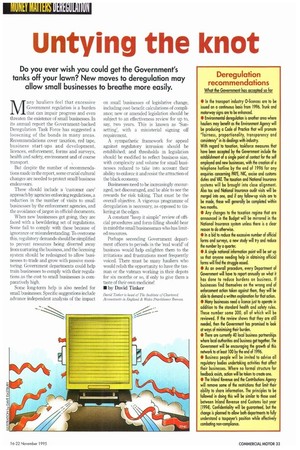Untying the knot
Page 35

If you've noticed an error in this article please click here to report it so we can fix it.
Do you ever wish you could get the Government's tanks off your lawn? New moves to deregulation may allow small businesses to breathe more easily.
...Many hauliers furl that excessive
Government regulation is a burden that can impair progress and even threaten the existence of small businesses. In its annual report the Government-backed Deregulation Task Force has suggested a loosening of the bonds in many areas. Recommendations cover taxation, red tape, business start-ups and development, licences, enforcement, forms and surveys, health and safety, environment and of course transport. ,.
But despite the number of recommendations made in the report, some crucial cultural changes are needed to protect small business endeavours.
These should include a 'customer care' approach by agencies enforcing regulations, a reduction in the number of visits to small businesses by the enforcement agencies, and the avoidance of jargon in official documents.
When new businesses get going, they are faced with a bewildering set of regulations. Some fail to comply with these because of ignorance or misunderstanding. To overcome this, regulatory demands should be simplified to prevent resources being diverted away from nurturing the business, and the licensing system should be redesigned to allow businesses to trade and grow with passive monitoring. Government departments could help train businesses to comply with their regulations as the cost to small businesses is comparatively high.
Some long-term help is also needed for small businesses. Specific suggestions include advance independent analysis of the impact on small businesses of legislative change, including cost-benefit calculations of comp]iance; new or amended legislation should be subject to an effectiveness review for up to, say, two years. This is known as 'Sunsetting', with a ministerial signing off requirement.
A sympathetic framework for appeal against regulatory intrusion should be established; and thresholds in legislation should be modified to reflect business size, with complexity and volume for small businesses reduced to take into account their ability to enforce it and resist the attraction of the black economy.
Businesses need to be increasingly encouraged, not discouraged, and be able to see the rewards for risk taking. That must be the overall objective. A vigorous programme of deregulation is necessary, as opposed to tinkering at the edges.
A constant "keep it simple" review of official procedures and form-filling should bear in mind the small businessman who has limited resources.
Perhaps seconding Government department officers to periods in the 'real world' of business would help enlighten them to the irritations and frustrations most frequently voiced. There must be many hauliers who would relish the opportunity to have the taxman or the vatman working in their depots for six months or so, if only to give them a taste of their own medicine!
• by David Tinker
David Tinker zs head of The Institute of Chartered Accountants in England & Wales Practitioner Thrreagr.




























































































































